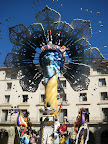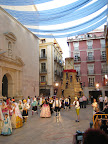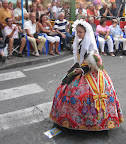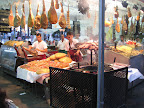Until recently I went to a Spanish class at the local college. Every now and again we were given homework to write a short piece about something or other.
Somewhere else in this Blog are a couple of posts about the Adult Education Days where students from the various adult classes in the area come together and wander around the host town. As a part of those days the colleges club together and produce a little book.
One of my homework essays was printed as a part of that book so I can now claim to have been published in two languages as I had a couple of articles in MG magazines back in the UK and now this. Polyglot or what?
The big advantage is that most of you won't be able to read the drivel but, nonetheless, here it is:
Así es la VidaAl chico nunca le gustaban los estudios pero era muy trabajador y durante su carrera universitaria, más o menos, vivía en las aulas y biblioteca de la universidad. Cada día solía estudiar hiciera sol o lloviera Quería sacar buenas notas, buscar un buen trabajo, llegar a ser rico y casarse con una chica guapa.
Un martes se encontró con una chica al otro lado de la estantería en la biblioteca de la universidad. Empezaron a hablar. Chismorrearon. Ligaron. Ella fingió timidez y él ser hombre del mundo.
El noviazgo no duró ni siquiera unos días. Cenaron en un restaurante de lujo debajo de la luna bebieron un lago de vino y coñac. Fue suficiente. El hombre la pidió matrimonio. Ella estaba un poco borracha; dijo sí.
Antes de tres semanas se presentaron en el altar de la iglesia parroquial. Él llevaba un traje y corbata prestado de su hermano. Ella parecía un merengue en un vestido hecho por su abuela. Se enlazaron.
Echaron un polvo un par de veces; eran jóvenes y aun no tenían muchos quehaceres en la casa y no había nada por la telé. De pronto llegaron los niños. ¡Tuvieron suerte y vinieron dos – los gemelos - ¡qué bendición! La pareja estaba muy contenta.
El varón intentó ser un buen marido - desempeñó su papel de nuevo hombre con gusto – cuidaba de los niños, barría el suelo y llevaba zapatillas para evitar traer el polvo de la calle a casa.
Los dos trabajaban muchas horas cada día, tenían que contratar a una niñera, nunca jugaban con los niños. Aunque la pareja llegó a ser más rica, y más bien vestida empezaron a discutir. Ya padecían la deuda de un pequeño país, tenían bastantes quehaceres en la casa y demasiado trabajo en la oficina, y no les quedaba suficiente tiempo, o deseo, para cuidarse, mimarse o hacer el amor de vez en cuando.
Un día la mujer se compró una ropa muy rara, un billete de avión al Caribe y se despidió de su marido y los gemelos con una sonrisa y un saludo con la mano
El hombre volvió a trabajar y, sentado en su sillón de ejecutivo empezó a buscar por Internet – necesitaba encontrar a una nueva mujer para cuidar de su casa, de los niños y de él.
Christopher Thompson
Castellano para extranjeros II
I have to say that I preferred lots of the others so, I thought, as I'm being even more self indulgent than usual, that I'd print one I liked here.
Una parada en Castilla la ManchaSon las cuatro de la mañana. El autocar está aparcado fuera de una estación de servicio cerca de Albacete. La cafetería tiene un olor leve de vomito y lejía y está, más o menos desierta - hay una mujer en la caja, un hombre con una escoba y nosotros.
El hombre que estaba sentado a mi lado en el autobús podía ser etíope o somalí – tiene el aspecto de ser de aquella parte de África - pero como no habla ni castellano ni inglés nunca lo sabré. Hay marroquíes también – muchos marroquíes – y latinoamericanos, la mayoría ecuatorianos. En Albacete un hombre con gena en la barba y una de estas camisas largas, llevando el obligatorio chaleco de poliéster, bajó del autobús y desapareció en la noche. Y, por supuesto, hay unos españoles. Pero nadie me parece rico. De hecho la mayoría tiene un aspecto de pobreza - desaliñados y cansados. Como la regordeta que lleva los pantalones negros de esquiar, muy ajustados, tacones altos y complementos amarillos. Uno conjunto que grita “puesto de mercadillo”.
Por lo menos cuatro continentes – deriva continental.
Y yo, estoy aquí también, un mileurista, perdido en un país extranjero, otro inmigrante, los pobres que luchan para perdurar. A las cuatro de la madrugada en el autobús con rumbo a Madrid.
 My bosses at RústicOriginal still run the car boot sale every Sunday at their out of town premises. I don't go very often but Maggie carefully explained to me that we were in urgent need of geraniums and that attendance was both desirable and necessary
My bosses at RústicOriginal still run the car boot sale every Sunday at their out of town premises. I don't go very often but Maggie carefully explained to me that we were in urgent need of geraniums and that attendance was both desirable and necessary











